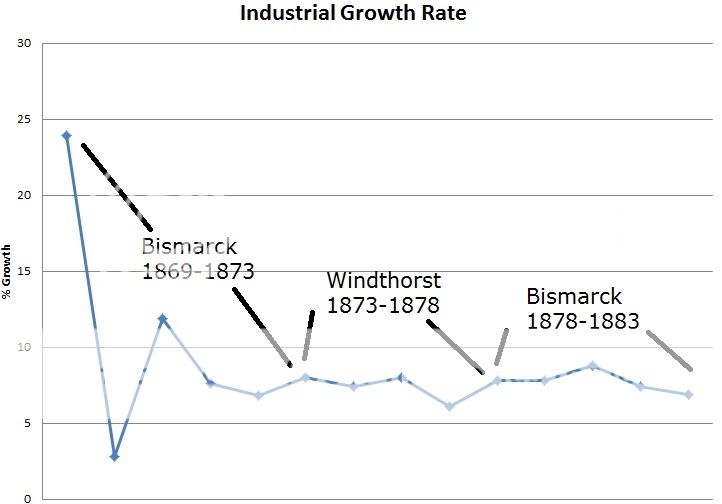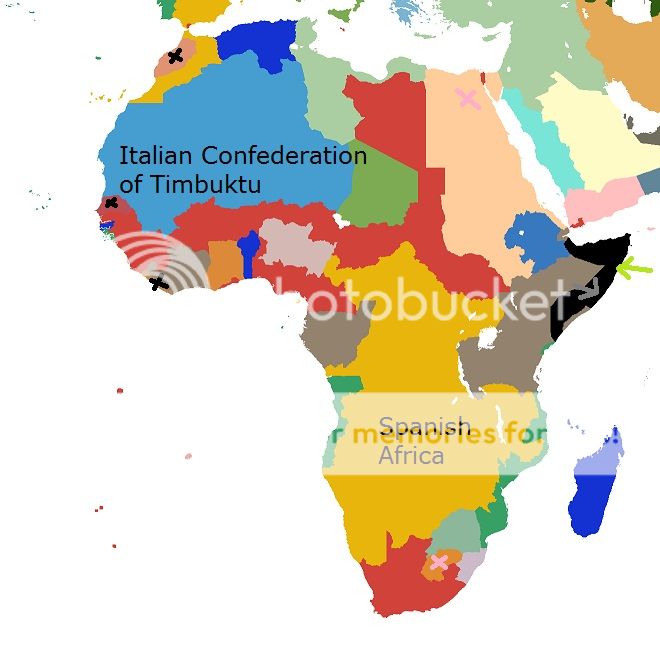1878-1883
Darker Clouds

Looking exclusively at the industrial growth rate of Germany in comparison with the rest of the world, Bismarck’s administration appears to have achieved incredible economic feats. In 1880 the German economy surpassed the US to become the largest on earth, throughout the period of Bismarck’s government Germany outstripped the growth rate in all other Great Powers – of the major industrial nations only rapidly developing Japan had a higher growth rate. The DKRP government had largely achieved these feats by blanket support for German industry funded by major tax rises. With the metropolitan population of Germany rising to almost 53,000,000, and rural urban migration continuing at pace the need to maintain a constant and high growth rate in order to prevent high levels of unemployment haunted the Empire.
During the late 1870s the world economy had been shocked by dramatic collapses in the prices of several key industrial goods – notably machine parts, textiles, cement and steel. Like so many economies Germany was hit hard, however the new social legislation in the country helped protect the population at large from pauperisation whilst mass unemployment (although German unemployment did rise not insignificantly) was avoided thanks to industrial subsidisation. This in turn caused a major fiscal crisis in Germany as national debt rose to worrying levels in 1879-1880 and in 1882. Economic opinion in Germany was deeply divided, some advised a return to free trade (believing that tariffs had played a major role in the struggles of industry) and laissez faire to allow failing industries to collapse and new modern factories to grow up whilst others did not waver from their calls to protect industry at all cost.

In Africa the colonial scramble was approaching its end by the early 1880s. The Germans were able to find a peaceful accord with the Spanish – establishing borders along the Congo River in West Africa and along a line of Great Lakes in East Africa. Elsewhere tensions flared far more with French and Dutch troops clashing briefly in the Togo before the Dutch backed down and Britain threatening Spain with war over Central Africa. In North Africa, the rump Sultanate of Morocco came under German influence – the Empire promising to protect it from Spanish annexation. Meanwhile, Somalia Italian and German interests were growing rapidly, causing friction between the two allies – virtually inseparable since the 1860s. Further inland in East Africa German attempts to bring Ethiopia under her influence had met trouble as the country erupted into political chaos – anti-German elements rising against the regime and later supported by the Egyptians (who seized control over parts of the country in 1882). The German authorities in East Africa were itching for an opportunity to strike back against the Ethiopians by 1883.
In West Africa the Italians formed the Confederation of Timbuktu to manage their colonial Empire, whilst the Germans formed the Kingdom of Senegal – based out of Dakar (by the proclamation of the Kingdom in 1880 a German majority city). Elsewhere in Germany’s colonial Empire the emigration of Germans was not so significant as to the Kingdom of Senegal – its West African provinces on the Ivory Coast had a German population of roughly 5-7%, with the territories around Gabon and the Congo having a German population closer to 1-2% and East Africa (by far the most populous region) having a German population around 2-3%. By 1880 the colonial Empire had overtaken America as the most popular destination for German emigrants.

With the economic situation was volatile and the colonial scramble a source of endless tension the most unstable feature of the world of the early 1880s was the diplomatic situation in Eastern Europe and the Balkans. A series of national revolts effecting first Poland in 1879 then the Ottoman Balkans in 1881 before the Austro-Hungarian Empire in 1881-82 shook Europe badly and sent her on the road to a major conflict. The crises in 1879 and 1881 drew Germany much closer to Russia as she first backed Russian sovereignty in Poland, whilst in 1881 Germany stood alongside Russia in support of intervention in the Balkans as both Britain and Austria-Hungary backed the Ottomans. In the end neither crisis escalated towards outright war yet Germany had successfully brought Russia to the brink of open alliance.

As the world began to cool from the tensions of the Balkans crisis early in 1881 an Italian revolt broke out in the Veneto in July. The Austro-Hungarians feared that if the Italians gained any significant foothold Italy would march to their aid and brutally repressed the rebellion, killing thousands in a matter of days. In the face of the suppression Italy declared war on July 21st 1881 and called upon their German allies to support them in the liberation of the Veneto. It marked the moment when Bismarckian diplomacy – that had aimed to integrate Germany into the European Balance of Power, rather than overturn it – failed. However, Germany’s diplomatic position was strong enough that the war did not escalate into a general European conflict. With Germany marching to war alongside Italy the Ottomans moved to support their Habsburg allies. The greatest fear of the Germans was the involvement of France and Britain – in the event France was involved in a brutal conflict in China, and therefore unable to assist the Austro-Hungarians whilst the British were simply unwilling to go to war with Germany and Italy (and potentially Russia as well).

The disparity in power between the Habsburgs and their allies and the Italo-German alliance was extreme. By the end of September the Austro-Hungarian Army had been destroyed as a viable fighting force along a front ranging from Silesia in the North to the Veneto in the South whilst the same month Vienna fell to German forces. As the war continued to drag on, and the total defeat of the Austro-Hungarians became more blatantly obvious talk of what peace to impose upon the defeated Empire rose ever further to the fore.
At home the Centre Party had been vehemently opposed to the war – seeing it as a betrayal of German and Catholic brothers – however they had later began to warm towards the idea of unification with the Germans of Austria. The Conservatives, and Bismarck especially, were strongly against any talk of unification yet within the party the hawks were beginning to overturn the influence of the dovish Bismarckians and they pursued the destruction of Habsburg power. Finally, the Liberals appeared divided as the old divisions over the Lesser and Greater German solution came to the fore once more. However the party strongly urged a harsh peace that would destroy the Austro-Hungarians (who were second only to France as opponents of German power in Europe) as a Great Power.
It was not to be internal political forces but external ones that would determine the eventual fate of the Habsburg Empire. With the Italians strongly supportive of a harsh treaty – one that would ensure their permanent military superiority over the Austrians – in February 1882 a large scale nationalist revolt broke out in Hungary, actively courting the enemies of Vienna whilst just one week later the Russians invaded Galicia.

In the peace treaty agreed between Italy, Germany and Russia on one side and the Austro-Hungarians (with their Ottoman allies) on the other, Habsburg power was dealt a near fatal blow. With the Veneto being transferred to Italy, Hungary gained its independence under a monarch to be agreed by the three victorious powers. With the separation of Hungary from Austria after centuries of unity, Austria’s time as a genuine Great Power appeared to be nearing an end – especially in light of the rising strength of Japan in the Far East. Within Austria, just as in Germany talk of unification between the German Empire and the German populated parts of the Habsburg Empire was eliciting serious interest for the first time since 1869.
In the months after the Austrian War Chancellor Bismarck continued his minority administration, yet was finding it increasingly difficult to work with the Centre Party. The renewal of the Anti-Socialist Laws in 1880 and 1882 (Bismarck pushed through the Laws’ renewal before elections due in January 1883) had caused controversy whilst the war with Austria-Hungary and subsequent alliance between the Centre and pro-unification groups within Austria following the war had further sparked tensions. With five years having passed since the previous election the DKRP decided to call for elections in January 1883, hopeful that their record over the past years would maintain their control over the Reichstag and with it German government.







